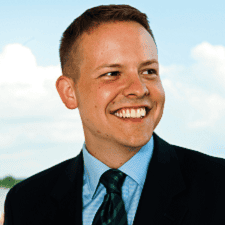
James Baehr
2012 Lincoln Fellow
What is your current position?
I serve as a federal prosecutor in New Orleans, prosecuting a wide variety of felonies in a great American city that struggles with one of the highest crime rates in the nation.
What inspired you to choose this career path?
I’ve been intrigued by criminal prosecution for a long time. I’m fascinated by criminal law, and by the motives of love, lust, and greed that drive men and women to do terrible things and then find redemption. And I love trial: it’s not enough to have a mastery of the law and the facts of the case, you have to react quickly to a witness changing their story on the stand, catch the cast of a glance of a juror, or the judge looking at her watch. It is this ultimate all-or-nothing human experience to find truth and enact justice on a public stage. It’s an honor and a challenge to be a part of it.
What are you currently working on?
I go to trial on a murder of a federal witness case soon. It’s surprisingly difficult to get people to come forward and tell the truth about crimes committed in front of them, so there is little we take more seriously than witness retaliation.
How did you hear about the Claremont Institute?
Way back in college, I heard from friends who did the Publius Fellowship, and then over the years I heard about the other fellowships offered. Participants glowed when they spoke of it.
What’s your fondest memory of the Claremont Institute?
The intellectual camaraderie–I made lifelong allies and deepened old friendships during my time at the Lincoln Fellowship. Attending other Claremont events is always a reunion of laughter amongst common souls.
There are all sorts of educational programs out there for current and rising conservative professionals. What do you think makes the Claremont Institute’s Fellowships unique?
The sustained intellectual focus on the philosophy of the Founders and Lincoln, and the fellowship that Claremont has created to carry on those ideas through the ages.
If you could have a drink with an American Founder, or any great thinker, who would it be, why, and what would you order?
Terribly cliché, but since I play the musical on repeat, I would have to say Hamilton. Soldier, lawyer, writer, and statesman, ambitious and flawed, candid and headstrong, we would have much to relate and debate. Let’s have some Caribbean fare in honor of his beginnings.
Who was more important for their time, George Washington or Abraham Lincoln? Why?
I’ve under-appreciated Washington in the past, but the first is the first, and his unwavering discipline and commitment to modeling upright leadership set the stage for all that followed.
What is the greatest challenge facing the United States today?
The breakdown of the common bonds that unite us: faith and patriotic fervor, among others. Absent unifying transcendent principles, people retreat into centrifugal identities of race, class and tribe that only further tear us apart.
What books are you reading right now?
I’m on a criminal justice kick right now, trying to devour everything in that topic area across the spectrum. David Kennedy, Heather MacDonald, The Collapse of American Criminal Justice (Stuntz) and The Rise and Fall of Violent Crime in America (Latzer).
As a judge advocate in the United States Marine Corps, what are some of the important lessons you’ve learned, both as a U.S. Marine and as a lawyer?
“I will never surrender of my own free will . . . I will never surrender the members of my command while they still have the means to resist.” Article II, Armed Forces Code of Conduct.
A good lesson to remember in life: don’t give up even when things seem hopeless. While in the Marine Corps, I requested prosecution and was assigned to be a defense counsel. I was in despair: unwinnable cases against tough Marine juries. But for someone with a libertarian bent, fighting the greatest deprivation of liberty of all had its appeal, and I poured myself into the endeavor. My co-counsel and I faced cases where we had no business prevailing, but we entered the courtroom with passion and a prayer and ended up achieving acquittals. I remember finding critical caselaw two weeks before trial on a surefire prosecution of a Vietnam War deserter that enabled me to get a mid-trial dismissal of the prosecution. The moral of the story is always the same: keep striving for the things that matter, against all odds.

